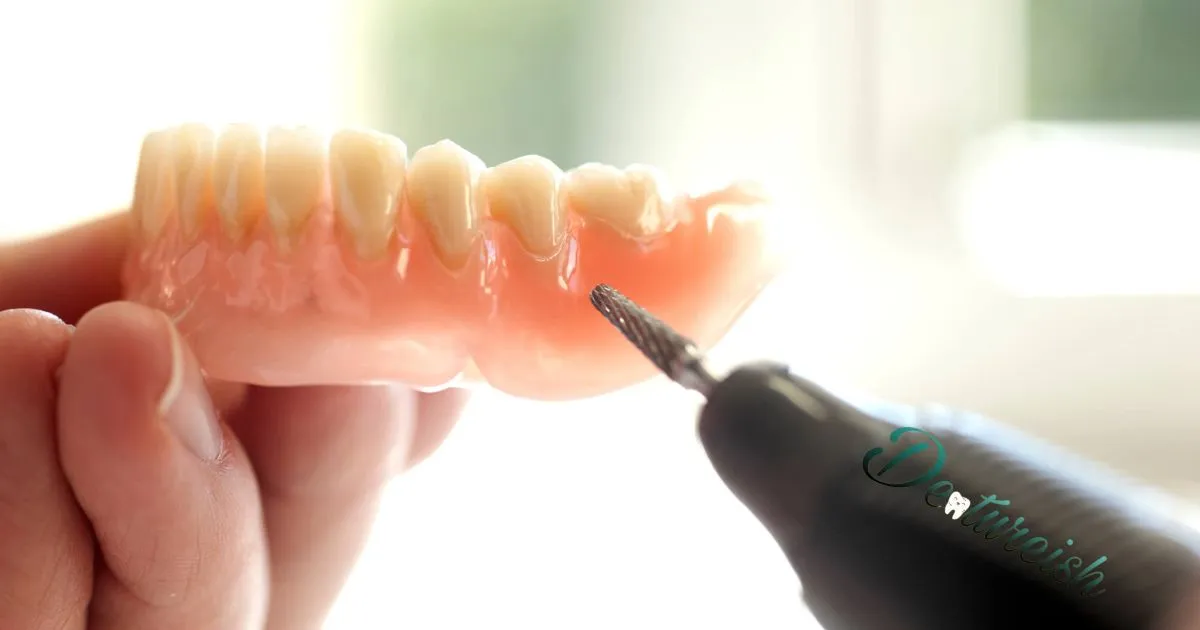Cleaning partial dentures with metal involves gently brushing the surfaces to remove food particles and plaque. Special attention should be paid to the metal components, ensuring they aren’t damaged during cleaning. Soaking the dentures in a mild solution helps eliminate bacteria and stains.
Are your partial dentures with metal losing their shine? It’s time to discover the secrets of How To Clean Partial Dentures With Metal effectively! Dive into simple yet powerful cleaning methods that preserve their quality and hygiene. Explore the steps needed to maintain a sparkling smile while ensuring your dentures’ longevity.
Stay with us to learn the best ways to clean partial dentures with metal. Discover gentle brushing techniques and proper soaking methods to maintain hygiene without harming the metal components. Explore our tips for stain removal and effective cleaning routines to ensure longevity and a bright smile.
Understanding Metal Partial Denture Hygiene Basics
Metal partial denture hygiene involves simple yet crucial steps. Start by gently brushing the dentures with a soft-bristled brush to remove food particles and plaque. Avoid abrasive materials to prevent damaging the metal.
Soaking the dentures in a mild solution helps eliminate bacteria. Regular cleaning routines are essential for maintaining hygiene and ensuring the dentures’ longevity.
Knowing the basics helps prevent complications. Brushing and soaking methods are key elements. They aid in removing debris and preventing bacterial buildup. Consistent care keeps metal partial dentures hygienic and durable.
Tools Needed For Effective Cleaning
To clean partial dentures with metal effectively, gather essential tools: a soft-bristled toothbrush and non-abrasive denture cleaner. These items ensure thorough cleaning without damaging the delicate metal parts. A denture-soaking solution aids in eliminating bacteria and stains from hard-to-reach areas, promoting hygiene and longevity.
A denture-cleaning brush helps access crevices, gently removing debris while safeguarding the metal clasps. Combine these tools with a mild cleaning solution to maintain your dentures’ cleanliness and shine. Regular use of these simple tools ensures a bright and hygienic smile.
Gently Brushing Without Damaging Metal Components
- Use a soft-bristled toothbrush: Opt for a brush specifically designed for dentures.
- Avoid hard-bristled brushes: They can scratch and damage the metal parts.
- Brush with gentle pressure: Clean the surfaces and crevices without exerting force.
- Use mild, non-abrasive denture cleaner: Prevents harm to the metal components.
- Focus on the denture surfaces: Pay attention to the metal areas while brushing.
- Rinse thoroughly after brushing: Ensure no residue of cleaning agents remains.
Soaking Methods For Thorough Cleansing
Soaking your partial dentures in a mild cleansing solution effectively removes bacteria and stains. Use a denture cleaning tablet or a solution of water and mild dish soap for about 15-20 minutes. This process helps break down debris without causing damage to the metal components.
Rinse thoroughly afterward to ensure no residue remains before wearing them again.Another effective soaking method involves using a mixture of equal parts water and vinegar. Let your dentures sit in this solution for around 30 minutes to help eliminate stains and bacteria.
Remember to rinse them well before putting them back in to avoid any taste or residue from the solution. These soaking methods ensure a thorough cleanse without compromising the integrity of your partial dentures.
Importance Of Regular Cleaning Routines
Regular cleaning routines for partial dentures with metal are crucial. Consistent care prevents plaque buildup, ensuring hygiene. Brushing daily helps remove food particles and stains. It maintains the dentures’ shine and longevity. Creating a routine with gentle cleaning ensures durability. It’s essential for oral health and a confident smile.
Ensuring the longevity and comfort of your partial dentures relies heavily on adopting a consistent care routine. How to take care of partial dentures involves adhering to regular cleaning routines. Neglecting this aspect may result in the accumulation of bacteria and unpleasant odors within the dentures.
Avoiding Abrasive Materials And Harsh Chemicals

To protect your metal partial dentures, steer clear of abrasive materials and harsh chemicals. These substances can damage the delicate metal components, affecting their longevity. Instead, opt for gentle cleaning solutions and soft-bristled brushes for effective maintenance.
By avoiding abrasives and harsh chemicals, you preserve the quality of your dentures and ensure they stay in top condition for longer.When cleaning your partial dentures with metal, prioritize mild cleaners over abrasive ones. Harsh chemicals might corrode or tarnish the metal, impacting both appearance and durability.
Choose non-abrasive options to maintain the shine and integrity of your dentures, safeguarding them against unnecessary wear and tear. Opting for gentle cleaning practices guarantees your metal partial dentures remain pristine without compromising their structural integrity.
Tips For Removing Stubborn Stains Safely
Stubborn stains on your partial dentures? Try gentle brushing using a non-abrasive denture cleaner. Apply the cleaner directly on the stains and use a soft-bristled brush to gently scrub them away. Rinse thoroughly after brushing to ensure all residue is removed.
For tough stains, soak your dentures in a mixture of water and denture cleaner, following the manufacturer’s instructions. Avoiding harsh chemicals is key to safely removing stubborn stains without damaging your dentures.Consider using baking soda paste as a safe and effective stain remover.
Mix baking soda with a small amount of water to form a paste, then gently rub it onto the stained areas using a soft brush or cloth. This natural method is often successful in lifting stains without causing any harm to your partial dentures. Regular maintenance and these safe stain removal techniques will keep your dentures looking clean and fresh.
Techniques For Cleaning Hard-To-Reach Areas
| Technique | Description |
| Denture Brush | Use a specialized denture brush with angled bristles. |
| Floss Threaders | Thread floss through hard-to-reach areas gently. |
| Denture Irrigators | Devices that spray water to clean inaccessible spots. |
| Soaking in Solution | Allow dentures to soak in a cleaning solution overnight. |
| Interdental Brushes | Small brushes to reach between teeth and around crevices. |
| Ultrasonic Cleaners | Devices using sound waves to clean hard-to-reach spots. |
These techniques cater to different needs and provide effective ways to maintain cleanliness in areas that are typically challenging to access during denture cleaning routines.
Maintaining Shine Without Compromising Durability
To keep your partial dentures with metal looking great while ensuring they last, regular maintenance is key. Gently brush the dentures, focusing on the metal areas, to remove food particles and plaque. Use a mild solution for soaking this prevents bacteria buildup without harming the metal.
By following these simple steps, you can maintain their shine without compromising their durability, ensuring a long-lasting, sparkling smile.Preserving the shine of your metal partial dentures doesn’t have to be complicated.
Avoid abrasive cleaners and harsh chemicals, as they might damage the metal. Instead, opt for gentle brushing and mild soaking solutions. This approach not only maintains the dentures’ shine but also upholds their strength and longevity, giving you confidence in your smile for years to come.
Proper Drying To Prevent Bacterial Growth
Drying your metal partial dentures thoroughly after cleaning is vital. Use a clean towel to gently pat them dry, ensuring no moisture remains trapped. This step stops bacteria from thriving in dampness, preserving oral health.
Allow your dentures ample air-drying time before storing them. Placing them in a dry container helps maintain their cleanliness. Proper drying significantly reduces the risk of bacterial growth, ensuring your dentures stay fresh and safe for use.
Ensuring Hygiene During Overnight Storage

Keep your partial dentures with metal clean while they rest overnight by following simple steps. Rinse them thoroughly before storage to remove any debris or leftover food particles. Place the dentures in a clean container filled with a denture cleaning solution or water to keep them moist and prevent drying.
Remember to avoid using hot water as it can distort the metal components of the dentures. Ensure the container has a secure lid to prevent contamination. Regularly clean the storage container and replace the solution to maintain proper hygiene for your dentures while they’re not in use.
Precautions For Delicate Metal Components
- Handle with care: Avoid bending or applying excessive force on delicate metal parts.
- Use gentle cleaning tools: Soft-bristled brushes and non-abrasive cleaners prevent damage.
- Avoid hot water: High temperatures can distort or damage the delicate metal components.
- Check for loose parts: Regularly inspect for any loose clasps or elements that may need adjustment.
- Store properly: Ensure proper storage to prevent accidental damage or bending of the metal parts.
- Follow professional advice: Consult your dentist for specific care instructions tailored to your dentures’ metal components.
- Avoid harsh chemicals: Use mild solutions or cleaners recommended for cleaning metal components to prevent corrosion or discoloration.
- Rinse thoroughly: Remove all cleaning agents thoroughly to prevent residue buildup on delicate parts.
Professional Care And Periodic Check-Ups
Regular check-ups with a dental professional are essential for maintaining healthy partial dentures with metal. These visits allow experts to inspect the dentures thoroughly, ensuring proper fit and function. Professionals clean hard-to-reach areas, preventing buildup that could lead to discomfort or damage.
These periodic check-ups also address any potential issues early on, such as loose clasps or worn-out components. Dentists make necessary adjustments, ensuring the dentures remain comfortable and functional. Their expertise guarantees that your partial dentures with metal stay in optimal condition for longer periods, minimizing the risk of complications.
Handling Metal Clasps With Care
When dealing with metal clasps on your dentures, handle them gently to avoid damage. Use soft-bristled brushes to clean around the clasps, ensuring thorough yet delicate care. Avoid harsh chemicals that might corrode or weaken the metal, preserving their strength. Regular inspection helps detect any issues early, ensuring your dentures remain secure and durable.
Properly maintaining metal clasps ensures their longevity and functionality. Ensure these components are cleaned regularly to prevent plaque buildup, which can compromise their effectiveness. Using mild cleaners and gentle techniques safeguards against unnecessary wear and tear, prolonging the life of your dentures and maintaining their secure fit.
Balancing Thoroughness With Gentle Cleaning
To maintain metal partial dentures, balance thoroughness with gentle cleaning. Brush surfaces gently to remove debris and plaque without damaging delicate metal parts. Soaking them in a mild solution helps eliminate bacteria and stains. Striking this balance ensures cleanliness without compromising the dentures’ integrity or durability.
When cleaning metal partial dentures, prioritize gentle techniques for longevity. Use soft brushes and mild solutions to prevent damage while ensuring thorough cleaning. By avoiding harsh methods, you safeguard the metal components, preserving their shine and functionality for the long term.
Preventing Corrosion And Metal Discoloration
To prevent corrosion and discoloration of metal partial dentures, regularly clean them using a soft-bristled brush and non-abrasive toothpaste. Avoid harsh chemicals that can damage the metal. Soaking dentures in a mild solution helps remove buildup and prevents staining.
Consistent cleaning routines maintain the shine and durability of your metal partial dentures, keeping them corrosion-free and looking bright. Another tip to prevent corrosion and discoloration involves rinsing your dentures thoroughly after meals to remove food particles. Pat them dry with a soft cloth to avoid moisture buildup.
Store them in a denture solution or water when not in use. These simple practices safeguard against corrosion and maintain the original colour of your metal partial dentures for longer periods.
Enhancing Longevity Through Proper Maintenance
To ensure your partial dentures with metal last longer, focus on proper maintenance. Regularly brush the dentures using a soft-bristled brush to remove food particles and plaque. Soak them in a mild denture cleaner solution to eliminate bacteria, ensuring cleanliness and durability.
Avoid harsh chemicals and abrasive materials to prevent damage to the metal components. Simple steps like these contribute significantly to extending the lifespan of your dentures.Consider periodic check-ups with your dentist for professional care. These visits help identify any issues early on, ensuring timely repairs and adjustments.
By staying proactive and maintaining a consistent cleaning routine, you can enhance the longevity of your metal partial dentures, ensuring a confident and comfortable smile for years to come.
Guidance On Cleaning Specific Metal Alloys
Cleaning specific metal alloys in your partial dentures requires targeted care. Begin by identifying the type of metal used, common alloys include cobalt-chromium and titanium. Use a soft-bristled brush to gently remove debris, focusing on intricate areas. Avoid harsh chemicals that might tarnish or damage the alloys.
, opt for non-abrasive cleaners recommended for your specific metal composition. Regular, gentle maintenance ensures your dentures retain their shine and durability, preserving your oral health.Different metal alloys demand tailored cleaning approaches. Understanding the composition helps select appropriate cleaning agents.
Utilize mild solutions or specialized cleaners designed for the specific alloy. Regularly inspect your dentures for any signs of discoloration or corrosion, promptly addressing any issues. By adhering to these alloy-specific cleaning guidelines, you’ll maintain the integrity and appearance of your partial dentures, ensuring their longevity.
Addressing Common Concerns And Misconceptions
Let’s clear up misconceptions about cleaning partial dentures with metal. Many worry about damaging the metal, but gentle brushing with soft bristles effectively removes debris without harm. There’s also a myth about using harsh chemicals opt for mild solutions to avoid any potential damage.
Common concerns revolve around metal discoloration, but regular cleaning prevents this. Some fear that thorough cleaning might weaken the metal, yet proper maintenance ensures durability. By addressing these misconceptions, you’ll confidently maintain your dentures’ cleanliness and quality.
Consistency: The Key To Lasting Cleanliness
Consistency ensures lasting cleanliness for your partial dentures with metal. Regularly brushing them with a soft-bristled brush prevents plaque buildup and food residue. Soaking them in a mild solution, like denture cleaner, keeps bacteria at bay and maintains their shine.
By sticking to these simple routines, you’ll preserve the cleanliness and durability of your metal partial dentures for the long haul.A commitment to regular maintenance is pivotal in sustaining the cleanliness of metal partial dentures.
Brush them gently after meals to prevent stains and plaque. Soak them nightly in a cleansing solution for a thorough cleanse, ensuring a hygienic oral environment. Consistency in these practices safeguards your dentures’ cleanliness, promoting a confident and healthy smile.
FAQ’s
How do you clean dentures with metal parts?
Brush gently with a soft-bristled brush, soak in a mild solution, and avoid abrasive materials to preserve metal parts’ integrity.
What is the best cleaner for metal dentures?
Mild solutions like denture cleaners or baking soda solutions work well, ensuring cleanliness without damaging the metal.
Can you soak metal partial dentures overnight?
Yes, but choose a gentle solution, avoiding harsh chemicals to prevent any potential damage to the metal components.
What is the best cleanser for partial dentures?
Mild cleansers like denture cleaning solutions or vinegar-water mixes effectively remove stains without harming the dentures.
Conclusion
Mastering the art of cleaning partial dentures with metal is vital for maintaining oral hygiene. By following the steps outlined in “How To Clean Partial Dentures With Metal,” you ensure a lasting sparkle and durability. Regular brushing and gentle soaking are the keys to removing stains and preventing bacterial buildup without harming the metal components.
In conclusion, with the right techniques and care highlighted in How To Clean Partial Dentures With Metal, you can preserve their quality and ensure a confident, radiant smile. Embrace these simple yet effective methods to keep your dentures impeccably clean, enhancing both their appearance and durability for the long term.

